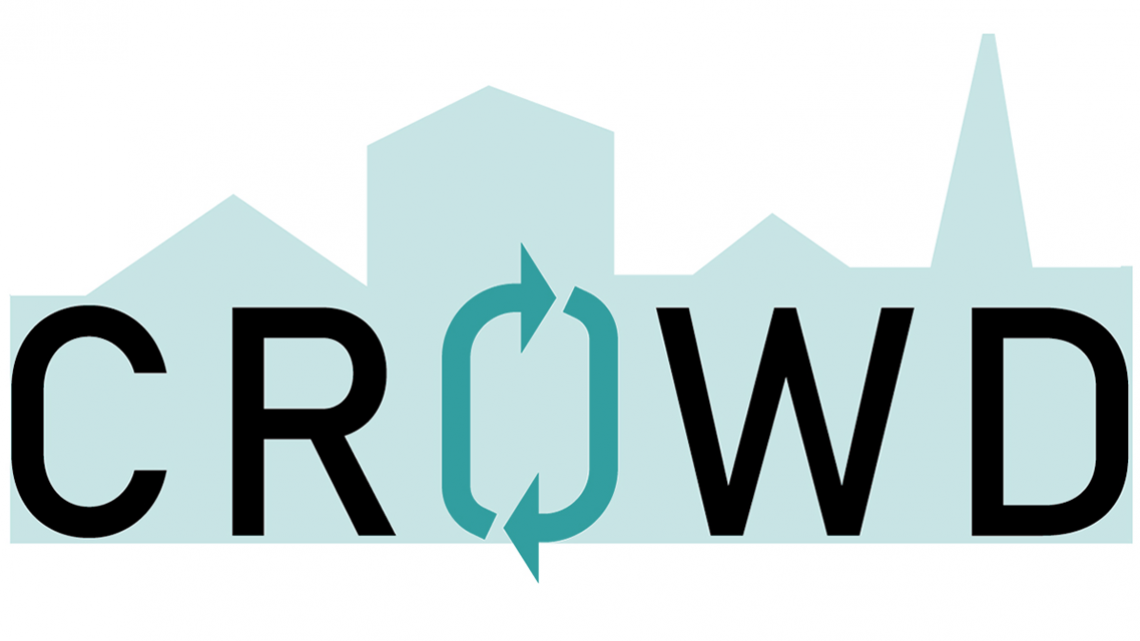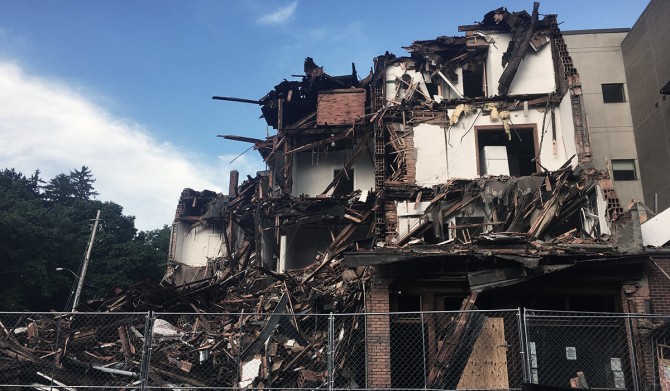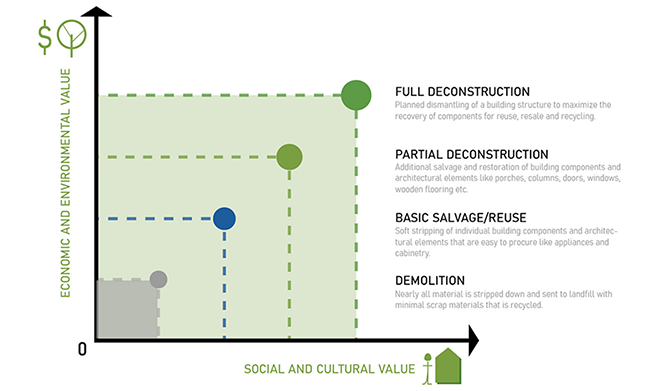
News directly from Cornell's colleges and centers
Break it down: CR0WD task force forges zero waste goals
By Patti Witten
Circularity, Reuse, and Zero Waste Development (CR0WD) is a newly formed collaboration that brings projects and research from AAP faculty-led labs together with experts across both the campus and the City of Ithaca to address sustainable development practices. At AAP, The Circular Construction Lab, led by Assistant Professor Felix Heisel, architecture, and the Just Places Lab, led by Associate Professor Jennifer Minner, CRP, are central to the research and organization of the task force. Heisel and Minner helped to form CR0WD in partnership with the Susan Christopherson Center for Community Planning directed by alumna Gretchen Worth (M.A. HPP '20); Historic Ithaca led by Susan Holland '85; municipal leaders, and local and regional stakeholders concerned with reuse, architectural salvage, preservation, and planning.
A cross-disciplinary, community-led initiative, CR0WD's primary goal is to shift current practices in the demolition of buildings that have reached the end of their lifespan. Instead, those involved propose deconstruction — a process that extends the lifespan of building materials — as common practice. The more building waste recovered, they say, the greater the economic, environmental, and social value.
Interdisciplinary collaboration is central to the effort. Minner notes, "Planners and architects can't hope to spur widespread transformation without the rest of the community and all forms of knowledge on deck, from critical perspectives to creative action." Heisel adds, "None of these disciplines alone can bring about a paradigm shift of the scale that we're talking about. It's natural that we collaborate within AAP and reach out to our local partners."
Circular construction requires a paradigm shift in the way we design, build, and manage our built environment. Including a building's end-of-use in the design process requires us to rethink materials, constructions, and business models, and, ultimately activates our cities as material depots for future constructions.— Felix Heisel
CR0WD was developed in fall 2020 when founding members found that within their different fields, perspectives, and ongoing collaborative combinations they were all working towards similar goals. Those involved developed shared objectives, and an intensive knowledge exchange the task force now aims to promote and support sustainability in the built environment across New York State communities with their cross-disciplinary expertise. Locally, the focus is directed towards the Green New Deal and carbon neutrality goals of the city and town of Ithaca.
CR0WD members quickly grew to also include the Preservation Association of Central New York led by Andrew Roblee (M.A. HPP '17); Finger Lakes ReUse led by Diane Cohen; Cortland ReUse; Historic Ithaca (with Holland and Preservation Services Coordinator Christine O'Malley), and City of Ithaca preservation planner Bryan McCracken (M.A. HPP '11).
"We all shared the sentiment that climate resilience, energy transitions, and social equity are tied to the built environment and that historic preservation and reuse are very important to this picture," says Minner. "Existing buildings contain not only embodied carbon but represent embodied histories and social relations. How we care for and maintain the built environment has deep implications for the ability to transform the local community into one that's more sustainable and climate-resilient."
"The collaborative nature of this task force and its engagement with the local community is incredibly important to the relevance of our research and teaching," says Heisel. "As a group, we can address the big picture, as well as the question of what should be done best locally and tomorrow. Considering that our goals for real-world impact and direct policy change, we are also very proud and appreciative of the fact that CR0WD includes both the city and town of Ithaca."
Collaborative seminars and projects within and beyond the college as well as support for and CR0WD-related research have all led to the growth and development of CR0WD's agenda over a short period of time. Heisel's spring 2021 seminar The Circular Economy: Science and Business of Construction, funded by the Office of Engagement Initiatives, is a collaborative project with Mark Milstein, a professor in the Johnson Graduate School of Management and director of the Center for Sustainable Global Enterprise, and local stakeholders from all stages of a building's life cycle. Students in Minner's Just Places Lab have been working on educational materials for CR0WD, including a model Sustainable Deconstruction Ordinance. Her Land Use Planning Methods class brought student projects and analyses to bear, including the study of parcels where demolition has taken place and research into questions around the storage of deconstructed materials and the relationship between zoning and building reuse. Minner also received a recent grant from the Clarence S. Stein Institute to support CR0WD-related research.
As our eyes have become more open to the challenges of climate resilience and response to climate change, it really takes public awareness, creativity, and entrepreneurs who are willing to take risks and show leadership. —Jennifer Minner
Broadly, Minner and Heisel are enthusiastic about the City of Ithaca's goal to carbon neutrality by 2030 and agree that big thinking can transform communities. According to Heisel, "Closing the material loop is an essential aspect of moving our industry and the built environment towards a circular economy with economic, ecologic, and societal benefits." After all, Minner says, "The existing built environment is going to be with us for a really long time."
Media Contact
Get Cornell news delivered right to your inbox.
Subscribe


